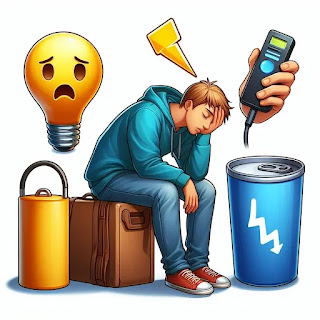✅ Medically Reviewed by Dr Lakesh Kumar Khatri MCPS Psychiatry
Introduction
A person who is struggling with their mental health may show various signs, and it's essential to recognize these to get the help and support they require. some common signs of poor mental health include:
🟢 Feeling Depressed or Unhappy
🟢 Feeling Anxious or Worried
🟢 Emotional Outbursts
🟢 Weight or Appetite Changes
🟢 Sleep Problems
🟢 Confused Thinking or Problems Concentrating and Learning
🟢 Extreme Mood Changes
🟢 Withdrawal from Friends and Low Energy
🟢 Detachment from Reality (Delusions)
🟢 Paranoia or Hallucinations
🟢 Inability to Deal with Daily Problems or Stress
🟢 Suicidal Thinking
It is important to understand that these signs don't always mean someone has a mental health disorder but they could be a reason for concern. If you or someone you know is showing any of these signs, It is advised to seek help from a healthcare Professional.
A person who is struggling with their mental health may show various signs, and it's essential to recognize these to get the help and support they require. some common signs of poor mental health include:
🟢 Feeling Depressed or Unhappy
🟢 Feeling Anxious or Worried
🟢 Emotional Outbursts
🟢 Weight or Appetite Changes
🟢 Sleep Problems
🟢 Confused Thinking or Problems Concentrating and Learning
🟢 Extreme Mood Changes
🟢 Withdrawal from Friends and Low Energy
🟢 Detachment from Reality (Delusions)
🟢 Paranoia or Hallucinations
🟢 Inability to Deal with Daily Problems or Stress
🟢 Suicidal Thinking
It is important to understand that these signs don't always mean someone has a mental health disorder but they could be a reason for concern. If you or someone you know is showing any of these signs, It is advised to seek help from a healthcare Professional.
1. Feeling Sad, Depressed or Unhappy
2. Feeling Anxious or Worried
Feeling anxious or worried can present in different ways, and it is important to understand the differences between the two.
Anxiety is defined as feeling extremely worried and scared about everyday events. It can make you feel really nervous and scared all of a sudden, making it difficult to carry out daily activities and maintain emotional control.
On the other hand, worry refers to uneasiness or a deep concern about a specific situation or problem. While worry and anxiety are normal emotional feelings that everyone goes through, if these feelings become too strong to the point where they interfere with daily life, it could be a sign of an anxiety disorder.
If you're constantly feeling anxious or worried and it is affecting your daily life, you should seek help from a healthcare professional.
3. Emotional Outbursts
Emotional outbursts mean when someone can't control intense emotions and they simply come out. This happens when someone is really stressed, has previously suppressed emotions, or has mental health issues. These outbursts may appear as sudden episodes of anger, crying, or extreme nervousness. They can be triggered by stress, lack of sleep, low blood sugar, or certain mental health problems.
It is important to understand possible reasons behind emotional outbursts as these can result from intense stress, adverse reactions to specific medications, traumatic brain injuries, and several types of mental health conditions such as anxiety disorders, PTSD, bipolar disorder, and personality disorders.
If someone has frequent or uncontrollable emotional outbursts, it is advised to seek help from a health professional who has expertise in mental health issues.
4. Weight or Appetite Changes
Weight Changes
Appetite Changes
5. Sleep Problems
6. Confused Thinking or Problems Concentrating and Learning
7. Extreme Mood Changes
8. Withdrawal from Friends and Low Energy
Social Isolation
Lack Of Energy
9. Detachment from Reality (Delusions)
10. Paranoia or Hallucinations
11. Inability to Deal with Daily Problems or Stress.
12. Suicidal Thinking
The Bottom Line
FAQs
Q.3 What are some common causes of poor mental health?
Some common causes of poor mental health include:
1. Adverse Childhood Experiences:
The impact of trauma or a history of abuse during childhood, such as sexual assault or witnessing violence, can be profound and have lasting effects on overall well-being.
2. Social and Economic Factors:
Social isolation, loneliness, discrimination, social disadvantage, poverty, debt, unemployment, and unstable living conditions can greatly affect overall well-being.
3. Biological and Genetic Factors:
Our overall well-being can be greatly influenced by inherited traits, specific genes, and brain chemistry. These factors play a crucial role in shaping physical and mental health.
4. Environmental Exposures:
Exposure to environmental stressors, toxins, alcohol, or drugs during pregnancy, along with brain damage caused by severe injuries, can have a significant impact on a person's development.
5. Lifestyle and Behavioral Factors:
Domestic violence, bullying, and other types of abuse can greatly affect overall well-being. These harmful behaviors can cause serious harm to mental and physical health.
6. Other Factors:
Chronic stress, losing a loved one, and long-term physical health issues can also have a significant impact on overall well-being.
It is worth noting that mental illnesses are caused by a combination of genetic, biochemical, environmental, and psychological factors.
Q.4 How to support a loved one with mental health issues?
It can be difficult to support a loved one who is suffering from mental health issues, but there are numerous ways to offer help and motivation.
Educate yourself
It is important to educate yourself about the specific mental health issue they're dealing with so that you can provide them with the right kind of support.
Listen and Show Compassion.
Take the time to really listen to them without any distractions and let them open up as much or as little as they feel comfortable with. Show them that you understand and care about what they're going through, and reassure them that they have your support. Remember, they need to know that they're not alone in this.
Offer Practical Help
Helping someone who is struggling with their mental health by offering practical help with daily tasks can be quite beneficial. Whether it is helping out with childcare or taking care of household tasks, can have a significant impact on their overall mental health.
Encourage Professional Help
You can offer to help them find professional support and connect them to resources that can be useful.
Respect Their Freewill
They should be allowed to make decisions about their treatment options.
Never forget that the support you offer is based on the individual's specific needs and preferences. It is important to encourage your loved one to seek professional help whenever necessary.
References
https://careinmind.com.au/blog/what-are-some-signs-of-poor-mental-health/
https://www.mayoclinic.org/diseases-conditions/mental-illness/symptoms-causes/syc-20374968
https://www.psychiatry.org/patients-families/warning-signs-of-mental-illness
https://www.healthdirect.gov.au/signs-of-mental-health-issues
https://www.medstarhealth.org/blog/6-signs-you-should-be-concerned-about-your-mental-health



















0 Comments